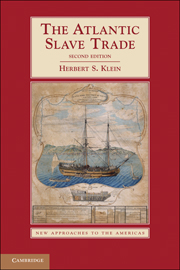Book contents
- Frontmatter
- Contents
- List of Maps, Figures, and Tables
- 1 Major slave-trading zones of western Africa
- 2 Major slave-trading ports of Senegambia and Sierra Leone
- 3 Major slaving ports of the Gold Coast and the Bights of Benin and Biafra
- 4 Major slaving ports of southwestern and southeastern Africa
- Introduction
- 1 Slavery in Western Development
- 2 American Labor Demand
- 3 Africa at the Time of the Atlantic Slave Trade
- 4 The European Organization of the Slave Trade
- 5 The African Organization of the Slave Trade
- 6 The Middle Passage
- 7 Social and Cultural Impact of the Slave Trade on America
- 8 The End of the Slave Trade
- Appendix
- Bibliographic Essay
- Index
Introduction
Published online by Cambridge University Press: 05 June 2012
- Frontmatter
- Contents
- List of Maps, Figures, and Tables
- 1 Major slave-trading zones of western Africa
- 2 Major slave-trading ports of Senegambia and Sierra Leone
- 3 Major slaving ports of the Gold Coast and the Bights of Benin and Biafra
- 4 Major slaving ports of southwestern and southeastern Africa
- Introduction
- 1 Slavery in Western Development
- 2 American Labor Demand
- 3 Africa at the Time of the Atlantic Slave Trade
- 4 The European Organization of the Slave Trade
- 5 The African Organization of the Slave Trade
- 6 The Middle Passage
- 7 Social and Cultural Impact of the Slave Trade on America
- 8 The End of the Slave Trade
- Appendix
- Bibliographic Essay
- Index
Summary
Despite its central importance in the economic and social history of Western expansion, its fundamental role in the history of America, and its profound impact on African society, the Atlantic slave trade remained one of the least studied areas in modern Western historiography until the past quarter century. This late start was not due to any lack of sources, for the materials available for its study were abundant from the very beginning. Rather, it was ignored because of its close association with European imperialism and a resulting lack of interest in a morally difficult problem, and because of a lack of tools with which to analyze the complex quantitative data.
Even today, despite a quarter century of sophisticated multinational studies, the gap between popular understanding and scholarly knowledge remains as profound as when the trade was first under discussion in literate European circles in the eighteenth century. For a variety of political and intellectual reasons having a great deal to do with the nature of contemporary North American politics, the scholarly research is largely ignored as a society riven by racial conflict finds the trade a topic too difficult to treat in a rational manner. Yet, in the heat of the debate it is this rationality that is most needed.
- Type
- Chapter
- Information
- The Atlantic Slave Trade , pp. xv - xxPublisher: Cambridge University PressPrint publication year: 2010

